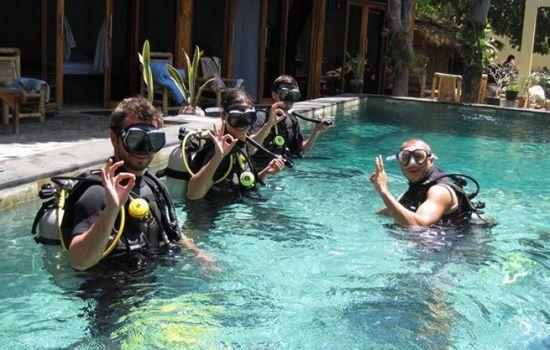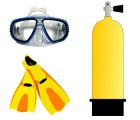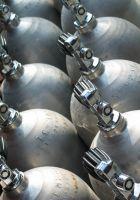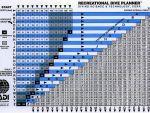 Breathing underwater is not natural for humans. Scuba diving allows us to float around weightlessly and breathe air for up to an hour or more in the sea and lakes. All scuba divers have to learn the theory and skills in order to dive safely. The process of learning to dive usually involves watching videos, answering questions in a test, and being taught skills which must be copied. The instruction videos are made by organisations such as PADI, SSI, CMAS and others. They are quite boring and appear to use language that is not aimed at easy comprehension. The staff who teach diving are known as ‘scuba instructors.’ The instructors train for their profession through courses to ensure that they maintain high levels of professionalism and safety. Throughout their careers they communicate with fellow professionals and their diving guests & students. Diving instructors around the world, both new and experienced, could improve their students’ experiences by changing their language and information.
Breathing underwater is not natural for humans. Scuba diving allows us to float around weightlessly and breathe air for up to an hour or more in the sea and lakes. All scuba divers have to learn the theory and skills in order to dive safely. The process of learning to dive usually involves watching videos, answering questions in a test, and being taught skills which must be copied. The instruction videos are made by organisations such as PADI, SSI, CMAS and others. They are quite boring and appear to use language that is not aimed at easy comprehension. The staff who teach diving are known as ‘scuba instructors.’ The instructors train for their profession through courses to ensure that they maintain high levels of professionalism and safety. Throughout their careers they communicate with fellow professionals and their diving guests & students. Diving instructors around the world, both new and experienced, could improve their students’ experiences by changing their language and information.
Let’s not be too technical all the time
 It is incorrect for all divers to use terms such as ‘goggles, flippers, & oxygen bottles.’ The correct terms are masks, fins, and air tanks. However, that should be the end of the technical rules. Too often unnecessarily-technical terms are used by dive instructors all around the world. They are similar to medical doctors, because they understand the terms themselves and use them among colleagues every day and often repeat the same words and phrases to their students. There is no emotion or feeling when they use technical terms, and the impact is lost or meanings not fully understood. Doctors and scuba diving instructors should reduce their technical vocabulary and explain to laymen in simple terms and give understandable reasons for regulations and advice. Like sick patients, scuba diving students have a lot of other things on their mind and need things explaining simply and clearly.
It is incorrect for all divers to use terms such as ‘goggles, flippers, & oxygen bottles.’ The correct terms are masks, fins, and air tanks. However, that should be the end of the technical rules. Too often unnecessarily-technical terms are used by dive instructors all around the world. They are similar to medical doctors, because they understand the terms themselves and use them among colleagues every day and often repeat the same words and phrases to their students. There is no emotion or feeling when they use technical terms, and the impact is lost or meanings not fully understood. Doctors and scuba diving instructors should reduce their technical vocabulary and explain to laymen in simple terms and give understandable reasons for regulations and advice. Like sick patients, scuba diving students have a lot of other things on their mind and need things explaining simply and clearly.
The rules of scuba diving – without getting technical
Anyone learning to dive has a lot of information to take in, and at the same time preparing themselves to do something new and unnatural. While it is necessary for all divers to know the safety regulations and reasons, the way it is taught by PADI (and other) scuba diving instructors often involves the students not understanding everything clearly. This section simplifies what we can do underwater, and why.
 - Almost all new scuba divers are just breathing normal compressed air, from an aluminium tank. There are times when more oxygen or other gases are added, but for basic scuba diving it’s just air. In most cases, divers use about 75% of the air in the tank for each dive. The remaining 25% is kept as a safety barrier. It is almost impossible for a diver who is trained properly or in the care of a diving professional to run out of air while underwater.
- Almost all new scuba divers are just breathing normal compressed air, from an aluminium tank. There are times when more oxygen or other gases are added, but for basic scuba diving it’s just air. In most cases, divers use about 75% of the air in the tank for each dive. The remaining 25% is kept as a safety barrier. It is almost impossible for a diver who is trained properly or in the care of a diving professional to run out of air while underwater.
- Controlling neutral buoyancy and breathing normally are the most important things to do underwater. The only way to do these successfully are relaxing your mind & body. Holding your breath not only makes relaxing impossible, it is dangerous to do this while diving. If you hold your breath in, you’re likely to float upwards and this will cause your lungs to expand. In extreme cases, this can kill you!
- The deeper you go, the less time you have. There are two reasons why diving deep reduces your time underwater.
The first is that (for scientific reasons most people don’t need to worry about) breathing compressed air while underwater uses more of your air the deeper you are. One lungful breathed at a depth of 30 metres takes a lot more of your supply from the tank than one lungful breathed at 10 metres does. Therefore, your supply of air will not last as long during a deep dive when compared to a shallow dive.
The second reason is that when you dive deep, you need more time to rise to the surface, and therefore you don’t get much time at your maximum depth. Breathing compressed air at deep depths causes more nitrogen to be in your body than normal, and you need to get it out before you return to the surface. The only way to get the excess nitrogen out is to stay underwater, at shallow depths, and continue breathing normally.
In summary, a diver at a depth of 8-10 metres below the surface will be able to stay underwater for a very long time. The air supply will easily last for over one hour, and there is no need to worry about excess nitrogen in the body. However, a diver who goes down to 30 metres or more must reduce the time at his or her maximum depth, and then spend time in shallow water waiting for the nitrogen to be breathed out safely. To make things worse, the air doesn’t last as long at depth and will therefore reduce the time of the dive.
- Currents are vital to marine life. The moving water brings food for all the fish, corals, and everything else that lives below the surface of a lake or the sea. Fighting a currents is not only tiring, it wastes your supply of air. A diver’s safety is always most important in scuba diving, and each dive is planned in advance by the Divemaster guide or instructor. The time of day and diving location is chosen to ensure that the divers experience as little current as possible. If there is a current, it is most common for the dive to begin ‘up current’ at the dive site, and the divers can float along with it, drifting past the reef effortlessly. At the end of the dive, the boat will be waiting for the divers to return to the surface ‘down current.’ Trusting your boat captain, crew, and Divemaster guide will ensure that you relax, and therefore use less air and enjoy your dive more.
-  Up until the turn of the 21st century, diving tables were created and used to ensure that the time and depth spent underwater was safe, especially regarding the gases in our body such as excess nitrogen. These tables were formed by experts in Naval Forces around the world. Anyone learning to dive needs to understand how long and how deep each dive should be, and why. Nowadays, dive computers are used, just like a digital wristwatch. These computers make diving easier and safer for everyone. While some diving computers can monitor the amount of air left in the diver’s tank, they are mostly used to tell the diver at what depth to be at and for how long.
Up until the turn of the 21st century, diving tables were created and used to ensure that the time and depth spent underwater was safe, especially regarding the gases in our body such as excess nitrogen. These tables were formed by experts in Naval Forces around the world. Anyone learning to dive needs to understand how long and how deep each dive should be, and why. Nowadays, dive computers are used, just like a digital wristwatch. These computers make diving easier and safer for everyone. While some diving computers can monitor the amount of air left in the diver’s tank, they are mostly used to tell the diver at what depth to be at and for how long.
 The dive computers are extremely sensitive to pressure, and know at exactly what depth the person wearing it is at any given time. A computer only worn by one diver will also calculate other dives on the day, or even the day before, to give personalized information. What the computers are used for is to warn the diver if he or she is moving up and down too much, rising up to the surface too quickly, or spending too long at a certain depth. The warnings are visual in the display and audible beeps which can be easily heard.
The dive computers are extremely sensitive to pressure, and know at exactly what depth the person wearing it is at any given time. A computer only worn by one diver will also calculate other dives on the day, or even the day before, to give personalized information. What the computers are used for is to warn the diver if he or she is moving up and down too much, rising up to the surface too quickly, or spending too long at a certain depth. The warnings are visual in the display and audible beeps which can be easily heard.
- Something that is impossible to change is the fact that the pressure around any object becomes greater as the depth increases. Even at 2 metres below the surface of a swimming pool, the effect of the increased pressure is easy to notice. Just like your ears feeling a change in pressure while on an aeroplane, they will feel it while you descend underwater. To ‘clear your ears’ is very simple, and necessary to enjoy every dive. Holding your nose closed through your diving mask and then trying to blow air out of your nose will instantly relieve the pressure. Doing this before you feel any pain is a much better idea than waiting for the pressure to hurt your ears.
Scuba diving is a very safe and enjoyable activity. If divers learn, understand, and follow the rules, almost nothing can go wrong. However, far too often information is given to learning dive students, and even certified fun divers, that they don’t fully understand. It’s very much like the announcements and written notices on aeroplanes. The information is provided too fast, unclearly and in language which is either too technical or too formal. Scuba dive instructors should really think about what they are saying and to whom when giving instructions. Not only is it common that either the instructor or the student (sometimes both) are not using their native language, the excitement of the moment for one and the lack of excitement of the other have a negative effect on understanding important information. Let’s keep it simple, and ensure that everyone learns to dive, and continues
